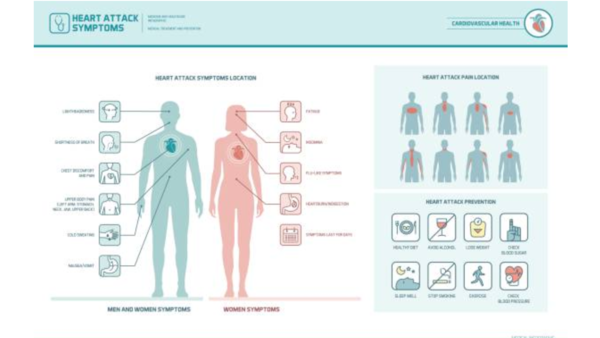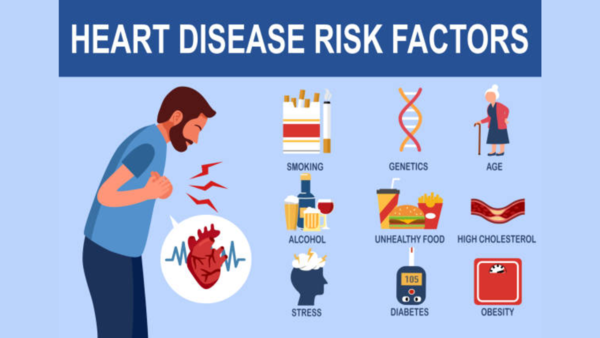
This makes it imperative to understand the signs of heart attack, the signals the body gives before the onset of this life threatening disease so that one can take precautions on time.
Unusual chest discomfort in the center or left side
You might experience discomfort in the center or left side of your chest. This discomfort can feel like pressure, squeezing, fullness, or pain. In simple words it might feel like an elephant sitting on your chest or like a tight band around your chest. This happens because the heart muscle needs a steady supply of oxygen-rich blood. When this supply is reduced or blocked, it can cause chest discomfort. If this discomfort lasts more than a few minutes or goes away and comes back, seek medical attention immediately.
You might feel like you can’t catch your breath
This might occur with or without chest discomfort. You might feel like you can’t catch your breath, or you might feel unusually winded even after minimal exertion. This happens when your heart isn’t pumping effectively, making it hard to breathe. Try to identify if the shortness of breath is sudden and severe or gradually worsening over time. If you find yourself unusually breathless, especially with chest discomfort, don’t ignore it. Contact a healthcare provider or go to the emergency room.
Pain in arms, jaw
This discomfort might radiate to your arms (often the left), back, neck, jaw, or stomach. It might feel like aching, heaviness, or pressure. Track where you feel pain and note if it spreads. Keep an eye out for unusual patterns, like pain starting in one area and moving to another. If you experience discomfort in these areas, especially if it’s combined with chest pain or shortness of breath, seek immediate medical attention.
Nausea or light-headedness
You might feel nauseous or dizzy, which can sometimes be mistaken for other issues like indigestion or a simple cold. Reduced blood flow to the heart can also affect other systems in your body, leading to gastrointestinal issues or dizziness. Monitor if these symptoms are accompanied by other signs like chest pain or shortness of breath. If you feel nauseous or light-headed, particularly if you’ve also experienced other heart attack symptoms, don’t hesitate to reach out to a medical professional.
Excessive sweating
You might sweat profusely, even if you’re not exerting yourself. This sweating can be cold and clammy, unlike normal sweating from exercise or heat. Your body might react to the stress of a heart attack with excessive sweating as a way to cope with the increased stress on your cardiovascular system. Compare this sweating to what you’d normally experience. Is it out of the ordinary for you? If this excessive sweating occurs alongside other symptoms, it’s important to get medical help right away.

Sudden fatigue
You might feel unusually tired, weak, or fatigued, even if you haven’t done anything strenuous. Your heart’s reduced efficiency can make it harder for your body to get the oxygen and nutrients it needs, leading to overwhelming tiredness. Track how this fatigue compares to your usual energy levels. Note if it comes on suddenly or gradually worsens. If you experience unexplained fatigue along with other symptoms, consider it a serious sign and seek medical advice.
An unsettling feeling
You might experience an overwhelming feeling that something terrible is about to happen. This sensation can be quite unsettling and intense. This feeling can be related to the body’s stress response during a heart attack, which may include anxiety or a sense of impending danger. Reflect on whether this feeling is new or if it’s accompanied by physical symptoms like chest pain or discomfort. If this feeling comes with other heart attack symptoms, it’s crucial to get emergency medical help.

What should you do?
- Familiarize yourself with these symptoms and how they might present themselves in different ways.
- If you notice these symptoms in yourself or someone else, try to stay calm. Panicking can make the situation worse and cloud judgment.
- Don’t wait to see if symptoms improve. Call emergency services or go to the nearest emergency room. Time is crucial in treating heart attacks.
- Understand your personal risk factors, such as family history, high blood pressure, high cholesterol, smoking, or diabetes. This knowledge can help you make proactive health choices.
- Regular visits to your healthcare provider can help you stay on top of your heart health and address any potential issues before they become serious.
- Eating a balanced diet, exercising regularly, avoiding tobacco, and managing stress are key to maintaining heart health.























